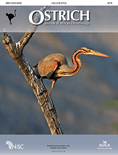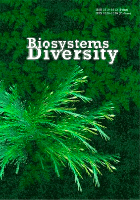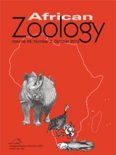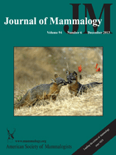
OSTRICH
Scope & Guideline
Unveiling Insights in Avian Behavior and Systematics
Introduction
Aims and Scopes
- Ecology and Behavior of Birds:
Research on various aspects of avian ecology, including foraging behavior, breeding biology, and social interactions among species. - Conservation Biology:
Studies aimed at assessing the conservation status of bird species, their habitats, and the impact of human activities on avian populations. - Taxonomy and Systematics:
Taxonomic revisions and classifications of bird species, including descriptions of new species and critical reviews of existing classifications. - Avian Biodiversity and Distribution:
Research exploring the diversity of avian species across different regions, focusing on factors influencing their distribution and habitat preferences. - Impact of Environmental Changes:
Investigations into how environmental changes, such as climate change and urbanization, affect bird populations and their behaviors.
Trending and Emerging
- Conservation Assessments and Status Reviews:
There is an increasing emphasis on comprehensive conservation assessments of bird species, particularly those that are threatened or endemic, highlighting the urgency of conservation efforts. - Use of Technology in Avian Research:
Innovative methodologies, such as image classification for population estimates and the use of GPS tracking, are becoming more prevalent, reflecting the integration of technology in ornithological studies. - Climate Change and Its Effects on Birds:
Research addressing the impacts of climate change on bird behavior, migration patterns, and breeding success is gaining prominence, underscoring the importance of this global issue. - Community Involvement in Conservation:
Studies that explore the role of citizen science and local community engagement in bird monitoring and conservation are on the rise, reflecting a shift towards collaborative conservation strategies. - Phylogenetics and Evolutionary Studies:
Emerging interest in evolutionary relationships and genetic diversity among bird populations is becoming more common, contributing to a deeper understanding of avian biodiversity.
Declining or Waning
- General Studies on Urban Birds:
While urban ecology remains relevant, specific studies solely focused on urban birds have decreased, possibly due to a shift towards more integrative approaches that consider urban birds within broader ecological contexts. - Historical Taxonomy without Modern Context:
There has been a reduction in purely historical taxonomic works that do not incorporate modern genetic or ecological insights, reflecting a growing preference for integrative approaches. - Studies on Common Species:
Research focusing on common or widespread bird species appears to be declining, as more attention is being directed towards threatened or lesser-known species that require urgent conservation efforts. - Single-Species Focus:
Research solely centered on individual species is waning in favor of studies that look at community dynamics and interactions within ecosystems.
Similar Journals

SPIXIANA
Fostering Knowledge in Animal SciencesSPIXIANA is a distinguished journal dedicated to the fields of animal science and zoology, published by VERLAG DR FRIEDRICH PFEIL in Germany. With the ISSN 0341-8391, it has been contributing to the scientific community since its inception, with volumes converging from 2008 to 2024. Although currently listed in the Q4 quartile of the 2023 category rankings for Animal Science and Zoology, it provides a vital platform for researchers and professionals to disseminate significant findings in the field. Despite being unindexed in open access, SPIXIANA ensures that vital research reaches its audience, enhancing academic discourse and furthering our understanding of zoological sciences. Its commitment to sharing rigorous scientific research make it an important resource for anyone passionate about animal biology and conservation.

ANNALES ZOOLOGICI FENNICI
Connecting Researchers for a Sustainable FutureANNALES ZOOLOGICI FENNICI, published by the Finnish Zoological Botanical Publishing Board, is a prominent scientific journal dedicated to advancing the fields of Animal Science, Zoology, Ecology, Evolution, Behavior, and Systematics. Based in Finland and serving an international audience, this journal has been an essential resource since its inception in 1974, offering valuable insights into biodiversity, conservation, and ecological dynamics. While it holds a respectable Q3 quartile ranking across several relevant categories in 2023, its impactful contributions to the scientific community continue to promote critical discussions and foster research collaborations. Although the journal is not currently open access, its robust indexing in Scopus and recognition within the academic community underscore its significance. As a researcher, professional, or student, engaging with the ANNALES ZOOLOGICI FENNICI not only enriches your knowledge but also aligns you with the forefront of zoological research and conservation studies.

BMC Zoology
Pioneering research in conservation and ecology.BMC Zoology, published by BMC, is a distinguished open-access journal that has been advancing the field of zoological research since its inception in 2016. With an impressive Q2 ranking in both Animal Science and Zoology categories as of 2023, the journal occupies a significant position in the academic landscape, engaging a global readership dedicated to the exploration of animal biology. Based in the United Kingdom, BMC Zoology prides itself on providing a platform for innovative research, fostering collaboration among scientists, and facilitating access to high-quality scholarly articles. Researchers and practitioners in zoology can benefit from its extensive repository of articles that span various areas including conservation, ecology, and evolutionary biology. As an essential resource for scholars and students alike, BMC Zoology commits to enhancing the dissemination of knowledge in the zoological sciences through its open-access model, ensuring widespread access to cutting-edge research findings.

ANIMAL BIOLOGY
Bridging Research and Ecological Awareness in Animal BiologyANIMAL BIOLOGY is a distinguished journal published by BRILL, focusing on the dynamic fields of Animal Science and Zoology, as well as Ecology, Evolution, Behavior, and Systematics. With an ISSN of 1570-7555 and an E-ISSN of 1570-7563, this quarterly journal serves as a pivotal platform for researchers and professionals seeking to contribute to the understanding of animal biology across diverse ecological contexts. The journal is recognized with a 2023 Scopus ranking of #234 out of 490 in the Animal Science and Zoology category, placing it within the 52nd percentile, alongside a rank of #409 out of 721 in Ecology, marking a solid contribution to the field. Although it currently holds a Q3 quartile in both categories, its commitment to quality research and novel insights continues to bolster its significance within the academic community. The open access option coupled with its publication history from 2003 to 2024 ensures a wide dissemination of knowledge, drawing in a global audience of researchers, professionals, and students eager to explore the intricacies of animal biology. By promoting high-quality discussions and innovative studies, ANIMAL BIOLOGY plays an essential role in advancing the understanding of life sciences and the evolution of biodiversity.

Biosystems Diversity
Empowering Research for a Sustainable FutureBiosystems Diversity is an esteemed open access journal published by the Oles Honchar Dnipro National University since 2009, based in Ukraine. Focusing on a wide array of topics within the fields of Ecology, Evolution, Behavior, and Systematics, the journal aims to foster the dissemination of cutting-edge research and innovative methodologies in understanding biodiversity and ecological interactions. With its ISSN 2519-8513 and E-ISSN 2520-2529, Biosystems Diversity has seen a consistent growth trajectory, earning a Q3 category for Ecology and a Q4 classification for Ecology, Evolution, Behavior and Systematics as of 2023, reflecting its dedication to high standards of scholarly excellence. The journal's rankings in Scopus solidify its relevance in the academic community, providing researchers and practitioners with vital insights into contemporary environmental challenges. As it converges towards its 2024 target, Biosystems Diversity continues to empower scientists, students, and professionals alike to explore new dimensions in the study of biological systems, offering crucial open access options for broader reach and engagement.

AFRICAN ZOOLOGY
Fostering Insights into Ecosystem DynamicsAFRICAN ZOOLOGY, published by Taylor & Francis Ltd, stands as a significant journal in the realm of Animal Science and Zoology, with a proud history dating back to 1996 and slated to continue until 2024. With an ISSN of 1562-7020 and E-ISSN 2224-073X, this journal provides a reputable platform for researchers and practitioners dedicated to the study of animal biology across the African continent. It has been recognized for its quality scholarship, evidenced by its Q3 categorization in the 2023 Scopus quartile rankings and an impressive rank of #182 out of 490 within its field. As an open-access journal, it facilitates the dissemination of vital research findings and promotes broader accessibility, catering to a diverse audience of professionals, scholars, and students alike. The journal aims to enhance our understanding of wildlife, conservation, and ecosystem dynamics in Africa, fostering collaborations that address critical ecological challenges. For researchers and enthusiasts keen on contributing to and staying informed about advancements in zoological science, AFRICAN ZOOLOGY is an essential resource that enriches the global discourse on biodiversity and conservation efforts.

NAUTILUS
Advancing Aquatic Sciences for a Sustainable FutureNAUTILUS is a distinguished journal published by the Bailey-Matthews Shell Museum, dedicated to advancing the understanding of aquatic sciences as well as ecology, evolution, behavior, and systematics. With an ISSN of 0028-1344, NAUTILUS has played a significant role in the scholarly community from its inception, with publication converged between 1996 to 2015 and 2017 to 2024. Although currently categorized as Q4 in Aquatic Science and Ecology, Evolution, Behavior and Systematics for 2023, the journal has a reputation for publishing high-quality research that contributes to the broader scientific discourse. Researchers and students alike can benefit from the insights provided by NAUTILUS, which remains committed to exploring the intricate relationships within aquatic ecosystems. Its editorial management, led by Dr. José H. Leal, ensures rigorous peer review and academic excellence, making it a crucial resource for those dedicated to discovering the complexities of aquatic and ecological research.

JOURNAL OF MAMMALOGY
Pioneering Research in Mammalogy and ConservationJournal of Mammalogy, published by Oxford University Press Inc, is a premier journal dedicated to the field of mammalogy, providing a key platform for researchers and professionals interested in the biology, ecology, and conservation of mammals. With a prestigious impact factor reflected in its Q1 ranking in Animal Science and Zoology, and multiple Q2 rankings in related categories such as Ecology and Genetics for 2023, this journal is recognized for its significant contribution to advancing knowledge in the discipline. The journal features rigorous peer-reviewed articles, ensuring high-quality research output valuable for students, academia, and conservation efforts alike. While not an open-access journal, it offers comprehensive subscription options for institutions and individual readers, promoting accessibility to critical findings in the realm of mammal research. Established in the earlier years of the 20th century, the Journal of Mammalogy has continuously evolved, serving as an integral resource for disseminating innovative studies and insights that drive the future of mammalian sciences.

MALIMBUS
Deepening understanding of bird species and their ecosystems.MALIMBUS is a peer-reviewed journal published by the West African Ornithological Society, focusing on the study of avian biology and conservation. It aims to disseminate important research findings that contribute to the understanding of bird species, their habitats, and the challenges they face across West Africa and beyond. Although currently not available in an open-access format, the journal is an invaluable resource for ornithologists, ecologists, and industry professionals keen on advancing their understanding of avian science. Those engaged in research on bird migration, breeding behaviors, and conservation strategies will find MALIMBUS to be a vital platform for sharing innovative ideas and fostering collaborations. With its commitment to quality and rigorous review processes, MALIMBUS is an essential reference for anyone dedicated to studying and preserving avian diversity.

ZOOLOGICHESKY ZHURNAL
Pioneering research in zoology for over seven decades.Zoologichesky Zhurnal, a prominent journal in the field of Ecology, Evolution, Behavior and Systematics, has been a vital publication since its inception in 1950. Published by MAIK Nauka-Interperiodica in the Russian Federation, this journal has established a notable reputation in disseminating scientific research and advancing knowledge in zoology. With its coverage spanning from 1950 to 2023, and a specific convergent focus during 1982-1983, this journal contributes significantly to the ecological and evolutionary sciences, even though it currently holds a Q4 classification in the 2023 category quartiles, indicating its niche positioning among peers. Researchers and students engaged in the study of biological sciences, particularly those interested in the dynamics of ecosystems, behavior of species, and evolutionary processes, will find valuable insights and original research articles within its pages. While access to this esteemed journal is not open, it remains an essential resource for those seeking to deepen their understanding of zoological sciences.